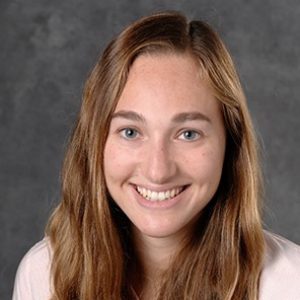The Upper Peninsula Draws in Medical Student
by Elizabeth Tuma
While preparing my application for The Integrated Program (TIP), I reviewed my past essays for medical school and the Rural Physician Program (RPP). I found that since writing those, I have not wavered in my ultimate goal and have continued to focus on the reality of practicing Family Medicine in the Upper Peninsula. I have had the opportunity to grow as a medical student through the RPP in Marquette; the possibility of continuing my training in the same community by participating in TIP makes my goal more tangible than at any other time during my education.
I feel TIP would be beneficial to me for the same reasons the RPP has been a valuable experience. Specifically, being familiar with my environment – the city of Marquette, the hospital and medical center, the general pace of the UP – has allowed me to jump right into clinical work while devoting less energy adjusting to a new environment. Knowing how the residency program functions and having worked with many of the faculty and residents will allow me to excel during my transition to residency. I’ll be able to spend less time adjusting to the general workflow, and more time thinking about patient care. I will also be able to establish relationships with patients during my time in the residency clinic, and these patients can more easily transition with me to where I end up working in the Marquette area after residency.
The opportunity to dedicate time and energy to a Senior Medical Student Project that extends throughout residency is another excellent benefit of participation in TIP, and will allow me to build on valuable experiences from my three years of medical school. My plan is to choose the Community Outreach/Public Health area of study, for a variety of reasons. First, community health is the framework in which I actively try to ground my clinical thinking. I attribute this to my graduate schoolwork in epidemiology, where I found I was more interested in how the individual subjects of my research project were affected by an exposure than discussing statistical analysis. Second, I have enjoyed being a part of evidence-based community health programs, like FitKids360 in Grand Rapids, during which I mentored families as they learned about healthy lifestyle changes. Lastly, I have discovered an interest and passion for working with patients affected by substance-use disorders.
During my Psychiatry Clerkship, I was able to spend time with patients on the substance use disorder unit as well as in outpatient Medication-Assisted Treatment (MAT) clinics. I’d often heard people say that the U.P. has an opiate problem, but I didn’t fully understand how it was affecting individuals and communities until these experiences. I found that I really enjoyed talking with patients and appreciated their openness and honesty, and found the majority of them to be insightful and far from the “difficult patients” that they are often projected to be. They were community members with jobs and families, and it was frustrating to hear how difficult it had been to find a physician to manage their MAT, but also moving to hear how well many of them were doing now. Because of these experiences, I am motivated to work with this population of patients and make their care at least part of my future practice. This is also why I hope to work with New Points, a needle exchange program coordinated by the Marquette County Health Department and Dr. Cara Crawford-Bartle, for my required project. I envision spending time at both the Marquette and Gwinn locations of the program, getting to know the people utilizing the service who might someday be my patients, and possibly providing health education and linking people to services within the community. I am looking forward to fleshing out this Community Outreach/Public Health idea, and making it a project that I can carry into residency and involve my co-residents with.
Overall, I believe that participating in TIP at the Marquette campus will build positively on my experiences in the RPP, and prepare me to be a successful Family Medicine Resident and future practicing physician in the community. Residency is often seen as a challenging time, but it is a challenge I feel confident I can tackle because of the strong learning environment and supportive culture I’ve been fortunate to be engaged in so far in Marquette. I look forward to working more with the Marquette Family Medicine residents and attending physicians during my fourth year of medical school, and to learning from a variety of patients in both the outpatient and inpatient settings. I’m also looking forward to staying in my hometown, where people care about their community and where my favorite biking and running trails are located. Participating in TIP will help me to achieve my goals and better care for my patients by continuing my medical education at a residency program that values work-life balance and appreciates our unique community,



